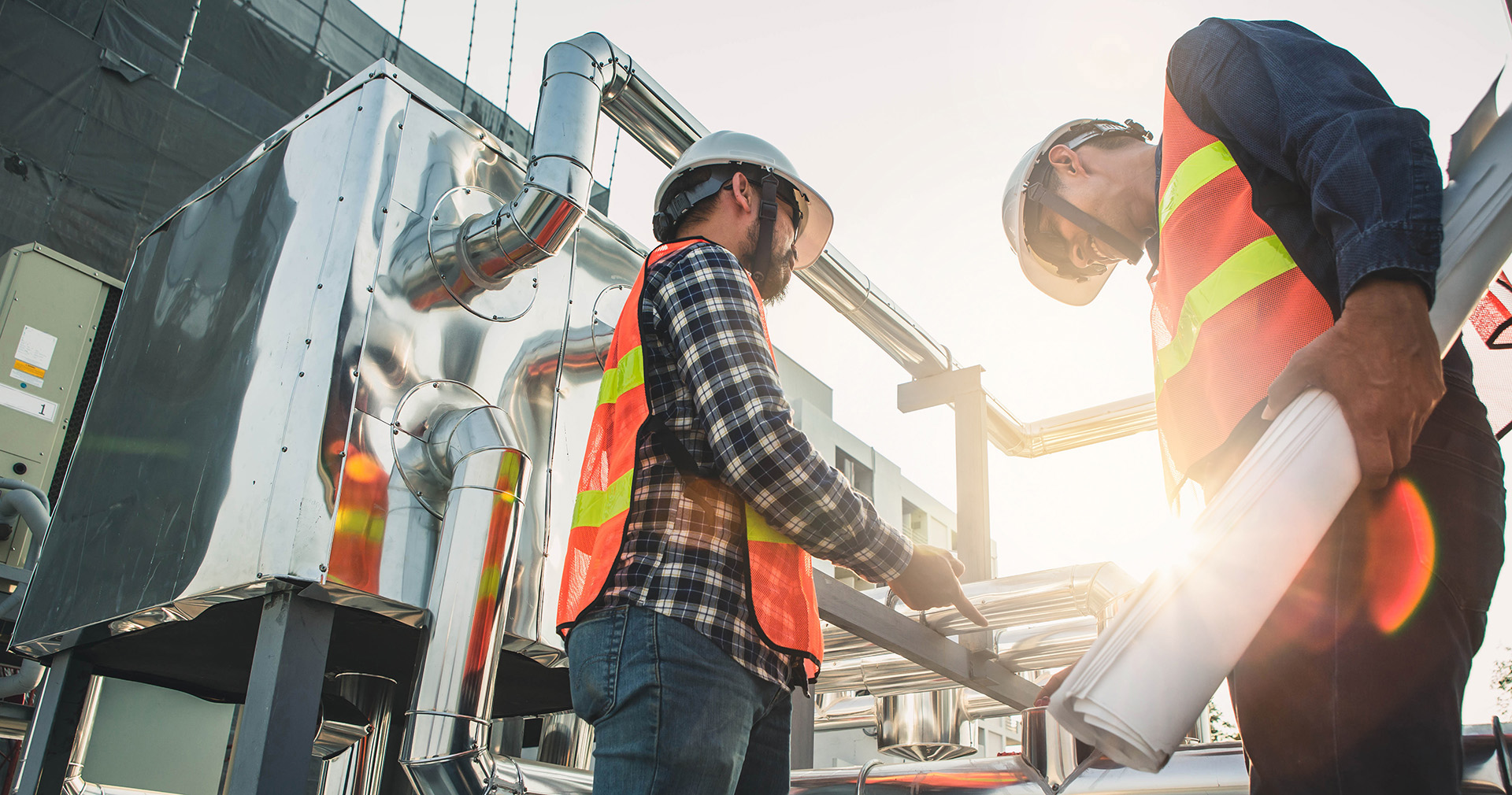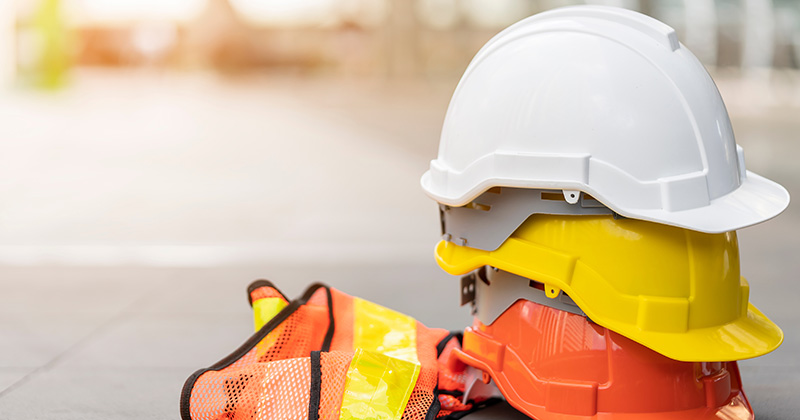
Being safe is really important when you work as an HVAC service technician. These technicians install, fix, and take care of heating, ventilation, and air conditioning systems.
But this job can be dangerous. As a business owner, you need to make sure your technicians are safe and protected.
In this article, we’ll talk about some tips to make HVAC technicians safer. We’ll explain why safety is so important and share some facts and trends about HVAC safety. We’ll talk about personal protective equipment (PPE). We’ll also give you some important HVAC safety tips and things you can do right away to stay safe. Let’s start!
Why Safety Should Be a Priority for HVAC Technicians

It’s essential to keep HVAC techs safe for a few reasons:
- Dangers. HVAC work involves dealing with electrical equipment, high-voltage systems, and heavy machinery. This makes the risk of getting shocked, burned, or injured higher.
- Health. HVAC technicians might come in contact with harmful things like chemicals and refrigerants. Breathing in these things can make them sick in the long run. It’s important to follow safety rules and wear protective gear to stay healthy.
- Carbon Monoxide Poisoning. HVAC systems, especially heating systems, can produce a gas called carbon monoxide. If they’re not maintained or vented properly, this gas can be really dangerous. It can even cause serious health problems or death.
Keeping your HVAC business safe protects your technicians from HVAC safety hazards. It also helps your business’s reputation. When customers see that you care about safety, they trust your services more.
Let’s see how safety can help your business.
Taking Care of Your Technicians
When you make safety a priority for your HVAC technicians, it shows that you care about them. This makes your business look good and trustworthy.
Customers like companies that value their employees and take their safety seriously. These companies are more reliable to customers.
Providing Excellent Services
Safety measures help HVAC technicians do their job better. When they follow safety rules, they can work more efficiently. They provide great service to customers.
By focusing on safety, the quality of your services improves. This makes customers happy, and they write positive reviews.
Building Trust and Dependability
Having a strong safety culture in your HVAC business builds trust and dependability. When customers see that you have a good safety program, they trust you to take care of their HVAC needs.
Trust and dependability are really important to customers. If you have a good reputation in these areas, customers will stay loyal and come back to you.
Standing Out from the Competition
In a competitive market, safety can make your HVAC business different from others. It shows that you’re responsible and reliable.
It also shows that you care a lot about creating a safe workplace. This makes people want to choose your business over others.
FROM ONE OF OUR PARTNERS: HVAC Marketing Strategies: How to Get More Leads
Positive Reviews and Recommendations
When customers feel safe and well taken care of, they tell other people about your business. This word-of-mouth advertising is really powerful. Positive reviews and recommendations can make your business look great.
Compliance with Regulations
By focusing on safety, you make sure your business follows all the rules and standards in the HVAC industry. This shows that you’re a responsible business. It also improves your reputation.
HVAC Safety Stats and Trends
Statistics and trends shed light on key HVAC safety concerns. Using these trends, you can identify areas in your business that need improvement. From there, you can design effective safety measures.
Here are some noteworthy stats and trends:
- High Rates of Injury. HVAC technicians have one of the highest rates of injuries and illnesses among occupations. Potential hazards include electrical shock and burns. Muscle strains and injuries from handling heavy equipment are also common issues. Proactive measures and proper HVAC safety training are vital for technicians.
- Fatal Work Injuries. In 2021, there were 5,190 fatal work injuries recorded in the United States. This marks an 8.9-percent increase from the previous year. This shows how important it is to have a safe working environment. All technicians should follow strict safety rules to prevent accidents.
- Chemical Exposure. Pressurized gas cylinders are often found on the back of an HVAC technician’s work truck. They can pose significant risks. Extreme summer temperatures can turn these cylinders into fire hazards. They can even cause explosions. Proper storage, handling, and transportation of gas cylinders are crucial to prevent accidents. Safety recommendations from the American Welding Society (AWS) can help mitigate these risks.
- Dangerous Driving. Driving to different job sites can be risky. If HVAC technicians get distracted, drive too fast, or act recklessly, accidents can happen. Safe driving practices and obeying traffic rules keep everyone safe on the road.
- Ladder-Related Falls. Each year in the US, over 100 people die, and thousands more are injured due to ladder-related falls. HVAC technicians often need to work at elevated heights. This increases the risk of falls.
The Importance of PPE
When it comes to the safety of HVAC technicians, personal protective equipment is vital.
PPE is specially designed gear that helps protect workers from potential hazards. It keeps them safe while they work on HVAC systems.
Here are some essential pieces of PPE that professional HVAC technicians should always use:
- Proper Clothing: HVAC technicians should wear long-sleeved shirts and long pants. They should choose durable materials like cotton or polyester. These clothes provide a protective layer. This shields their skin from cuts, scrapes, and exposure to harmful substances.
- Steel-Toed Boots. Steel-toed boots are a must-have for HVAC technicians. These boots have reinforced toes made of steel. They provide extra protection for the feet. They can prevent injuries from heavy objects falling on the feet or accidents involving equipment or tools. Steel-toed boots also offer better stability. They provide support, reducing the risk of slips, trips, and falls.
- Work Gloves. Work gloves are essential for HVAC technicians. They protect their hands from various hazards. These gloves act as a barrier against cuts, burns, and chemical exposure. When handling HVAC equipment or working with sharp objects, gloves with good grip provide better control. They help prevent accidents. They also offer insulation against electrical shock when working with electrical wiring.
- Safety Glasses. Safety glasses are an important piece of PPE for HVAC technicians to protect their eyes. These glasses shield the eyes from debris, dust, and harmful chemicals. HVAC systems can produce particles that may cause eye injuries when they become airborne. Wearing safety glasses ensures the technicians’ eyes are well-protected. Glasses with side shields are particularly effective. This reduces the risk of potential eye damage.
- Earplugs: The loud noises generated by HVAC systems can be harmful to the ears. This includes noises from air conditioning units and fans. HVAC technicians should wear earplugs to protect their hearing. Earplugs help reduce the intensity of the noise, making it safer for the technicians’ ears. By wearing earplugs, HVAC technicians can prevent long-term hearing loss.
FROM ONE OF OUR PARTNERS: The 11 Best Safety Glasses
5 Essential Safety Tips for HVAC Technicians

The safety of HVAC technicians is critical. The good news? There are several policies, processes, and equipment you can adopt. These measures help create a safer working environment. They also reduce the risk of accidents or injuries.
Let’s explore 5 essential HVAC safety tips.
1. Proper Use of Personal Protective Equipment
To keep HVAC technicians safe, give them protective gear. They need equipment like goggles, gloves, hard hats, and masks. This gear protects them from chemicals, falling things, and airborne particles. Make sure technicians know how to wear and take care of their gear. It’s vital for their safety.
2. Adopting Safety Precautions for Electrical Equipment
Working with electricity is an important part of an HVAC technician’s job. Here’s how to keep them safe:
- Additional Electrical Safety Training. Make sure your technicians get special training on electrical safety. They’ll learn about the dangers of electricity and how to stay safe. They’ll also learn the right steps to take when using electrical equipment.
- Regular Inspections. Your technicians should regularly check electrical wiring. They need to look for any damage or problems. This helps prevent accidents like shocks or fires.
- Proper Handling. Teach your technicians how to handle electrical equipment safely. They need to know to turn off the power and use insulated tools. This lowers the risk of getting shocked.
3. Ensuring Safety During HVAC Servicing Procedures
When working on HVAC systems, technicians must follow safety procedures. Here are some important tips to remember:
- Good Ventilation. Make sure there’s enough fresh air when working in small spaces. This prevents harmful gases from building up, like carbon monoxide. Fresh air keeps your team safe and helps them breathe better.
- Lockout and Tagout. Before fixing HVAC systems, turn off the power and lock it in place. Attach a tag to show someone’s working on it. This stops accidents and protects the worker from electricity.
- Lift with Care. When lifting heavy things, bend the knees and keep the back straight. Use the leg muscles to lift. This prevents hurting the muscles or bones.
- Regular Maintenance. Keep HVAC systems in good shape by checking them often. Clean them and replace filters. Look for any damage or problems. Fixing issues early on stops them from getting worse.
4. Resisting the Temptation of Shortcuts
Taking shortcuts is never a good idea. Skipping steps or rushing through tasks can be tempting, but it’s not safe.
Here’s why it’s important to follow the proper steps:
- Keeps Everyone Safe. HVAC systems are complicated. Following the right steps makes sure safety measures are in place. Taking shortcuts can put the technician and others at risk.
- Protects Equipment. HVAC systems need careful handling. Taking shortcuts can damage equipment. Technicians might do something wrong or fix something incorrectly. This affects how well the system works. It also increases the chance of accidents.
- Reduces Mistakes. When technicians rush or take shortcuts, they might forget important things. They could skip necessary checks. Mistakes become more likely, and that can be dangerous.
- Shows Professionalism. Following proper procedures shows that technicians are professional. It means they are careful and do their tasks well. This is good for the technician and the HVAC business.
Remember, taking shortcuts might seem fast, but it’s not safe. HVAC technicians should always follow the proper processes. This keeps them and others safe.
5. Encouraging Open Communication and Reporting Hazards
Communication is important for keeping everyone safe at work. This is especially true between HVAC technicians and business leaders.
Here’s why it matters and how to promote it:
- Open Reporting. Technicians should feel comfortable reporting any safety problems or worries they have. They should know they can speak up without any fear. It’s important for business leaders to listen and take their concerns seriously.
- Sharing Ideas. Technicians should share their experiences and suggest ways to make things safer. They can talk about what they’ve learned and what improvements they think should be made. Business leaders should encourage this and value their input.
- Safety Meetings. Regular meetings can be held to talk about safety. They’re called toolbox talks. In these meetings, you can discuss possible dangers and give tips on how to stay safe. Technicians can ask questions and talk about any concerns they have.
- Promoting Safety. These meetings help remind everyone about the rules for staying safe. They create a culture where safety is important to everyone. When everyone is involved, it makes the workplace safer.
FROM ONE OF OUR PARTNERS: HVAC Sales Tips to Help You Close More Business
Follow These 3 Steps and Take Action Now

Safety should be a top priority for your HVAC business. To ensure the well-being of your technicians and enhance your business reputation, it’s important to be proactive.
Follow these three easy steps and take action now.
Step 1: Review Your PPE
Check if your safety gear is in good condition. Look for any signs of wear, like tears or broken parts. Make sure everything is clean and working properly. If something is damaged, replace it right away. PPE keeps your technicians safe.
Step 2: Make a List of What You Need
Make a list of the safety gear you need to buy or replace. Think about what your technicians need for their work. Consider things like cost, quality, and availability when choosing the right gear.
Step 3: Have a Safety Meeting
Schedule a meeting with your team to talk about safety. Make sure everyone knows how important PPE is and how to use it correctly.
Discuss any changes to safety rules or procedures. Encourage your technicians to report any problems or concerns. Let them ask questions and share their experiences. This meeting will help create a safe working environment.
Related Posts
The Essential Painting Equipment List for Your Business
Continue ReadingGet Inspired: Our Favorite Actual Pool Company Names
Continue ReadingStay Informed
Get the latest news and insights plus, Service Fusion offers and updates.Thank you for your submission.

SHARE